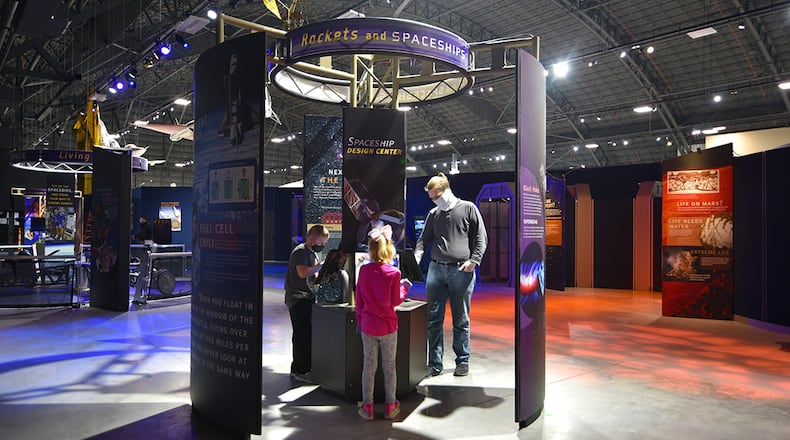“It’s ready for some amazing visiting opportunities,” said Michael Brimmer, chief of the education division. “So many of our kids are learning science, technology, engineering and mathematics through virtual means or remote learning. Now, there is an opportunity to come and experience it interactively. This exhibit does just that.
“The exhibit takes visitors through the history of space exploration into the future. There are so many examples and interactives multiple generations can learn from. It’s not just entertainment. This is – no kidding – educational information.”
The exhibit supports the very educational standards students receive through their schooling, Brimmer said, with content provided by NASA and the National Science Teachers Association.
Inside the “Space” exhibit are:
· Space bike where three people at least 48 inches tall can pedal to operate it, learning about physics and how astronauts exercise in space
· Living habitat and workspace designed for life on Mars
· Opportunities to touch pieces of the moon and Mars
· Lunar rover tire and other artifacts
· About 20 interactive stations, one of which invites visitors to design spacecraft and a Mars colony
· Up-close views of next-generation space technology
· Edition of Jules Verne’s “From the Earth to the Moon”
COVID-19 pandemic safety precautions are in place, and the exhibit is cleaned and sanitized throughout each day. Visitors ages three and up are required to wear masks during their visit to the museum. Only 60 people at a time may be in the exhibit.
There is a lot of room for social distancing – the museum has 19 acres under roof.
“It takes about an hour to go through the exhibit, so if there is a line, visitors may enjoy other parts of the museum and then go back to the exhibit,” Brimmer noted.
“That is no problem because there is so much to see. We’re in the fourth building and we’re surrounded by space exhibits, including spacesuits, the Space Shuttle Crew Compartment Trainer, a Titan IVB rocket, capsules from the Mercury, Gemini and Apollo missions, and satellites.”
Some early visitors to the exhibit enjoyed their tour. Kelly Daniel brought her children, Levi and Laney Daniel, and brother, Ben Thomas.
“They are so excited to come to this,” she said. “We do online learning, so this is a really exciting experience for them to be out of the house and we feel very safe.”
David Thomas, NMUSAF special events coordinator, said the exhibit’s large number of interactives is a plus for visitors.
“Here’s a new chance for younger and older visitors to touch and do things, to learn about space, in a very safe way,” he said.
“Space: A Journey to Our Future,” was made possible at the museum with support from the Air Force Museum Foundation and Dayton Aerospace Inc. (Federal endorsement not implied.) It is owned by Evergreen Exhibitions of San Antonio.
“It’s really worth your time to come and let your kids experience it,” Brimmer said. “We like to inspire and educate.
“We hope students want to strive to be that engineer or astronaut or somebody who is going to support the mission.”
To plan your visit
The National Museum of the U.S. Air Force, located on Wright-Patterson Air Force Base, is the world’s largest military aviation museum. With free admission and parking, the museum features more than 350 aerospace vehicles and missiles and thousands of artifacts amid more than 19 acres of indoor exhibit space. Each year more than 800,000 visitors from around the world come to the museum.
For more information, visit www.nationalmuseum.af.mil.
About the Author
